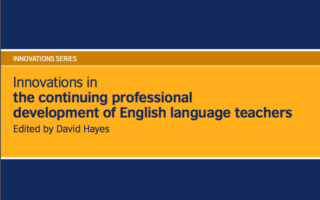
Last year I saw a call for chapter proposals for a British Council book on innovations in the continuing professional development of English language teachers. Every day I receive briefings and newsletters from the associations I’m a member of and from publications, websites, and communities I follow. Many times I come across such calls for proposals, but most of them are not within my areas of expertise or related to my teaching context. Besides, I usually think, “This is not for me. I’m not a scholar or a researcher.”
This one was different, though, and made me stop and read the content carefully. Upon analyzing what the purpose of the publication was and what they defined as ‘to innovate’ – not necessarily to create something groundbreaking that will revolutionize the world, but rather, to ‘make changes in something established, especially by introducing new methods, ideas, or products’ (www.oxforddictionaries.com) - I figured that, yes, I might have something to say. After all, I am involved in the planning of professional development programs and projects at the institution I work for and we have taken significant strides in innovating CPD in our institution. My big question was, “Would anyone care to know what one institution in one city in Brazil is doing?”
I decided, then, to propose writing a chapter, not about a single innovation, but rather, about a series of projects aimed particularly at differentiating professional development at Casa Thomas Jefferson in Brasilia. My idea was that the differentiation itself would be considered the innovation because the projects developed with this aim have made a change in something established, especially with regard to novice and more experienced teachers’ CPD opportunities. While in the past more experienced teachers were exposed to the same CPD programs as less experienced ones, nowadays they have the opportunity to be involved in giving talks, workshops, and mini-courses, mentoring novice teachers, blogging, or developing another project that they propose. Likewise, novice teachers now have ongoing programs especially developed with their needs in mind, rather than in a one-size-fits-all approach. They receive coaching and mentoring both from institutional coaches and from senior teachers. They also participate in a weekly induction program for one semester, with workshops directed to the aspects that they need to develop. This is the result of the institution’s recognition of the need to differentiate professional development and willingness to invest in it.
I am very happy that my proposal was accepted and that I managed to write my chapter. First, it was recognition from the editor, David Hayes, that what I was considering an innovation could indeed be called one and that it was worth writing a chapter about. This alone meant a lot to me. Not only that, it was also an indication that yes, what one institution in one city in Brazil was doing mattered to a wider community. Also, contrary to what I had originally feared, I was legitimized as an author, despite my not being a well-published scholar. Moreover, it was an invaluable opportunity to share with the whole world the CPD projects carried out at CTJ. Finally, and more importantly, writing the chapter provided me with the opportunity to reflect upon the projects we have implemented, their strengths weaknesses, what we can do to improve them, and how we can innovate even further and move towards more teacher-centered professional development. Had I not been involved in writing about these projects, I would probably never have taken the time to analyze them so thoroughly and conduct more formal surveys and interviews with the participants. In addition, I would not have taken the time to research the topic and become familiarized with updated literature on professional development of English language teachers, not to mention that I also developed my writing skills during the revising process, as David Hayes contributed significantly to the improvement of my chapter.
The book Innovations in the continuing professional development of English language teachers is out, with my chapter Differentiating continuing professional development in a large bi-national centre in Brazil. I hope you enjoy reading it and getting to know details about the projects I briefly described here. If you are interested in the topic, make sure you also read the other chapters about innovations in the continuing professional development of language teachers in many places around the world. It is an honor for me to be among such wonderful researchers and educators who have been working hard to provide purposeful CPD opportunities in their communities.
Writing this chapter on differentiating CPD ended up being a sort of differentiated professional development for me and boosted my confidence in my writing abilities. I’m sure many of you have experiences in your field of expertise worth writing about. When you see a chance to do so, take it!
This blog post originally appeared in a blog post by Isabela Villas Boasand is republished with her kind permission.
- You can visit her blog here: http://isabelavillasboas.wordpress.com/
- See the complete publication.
- Watch highlights from the international publication launch event.